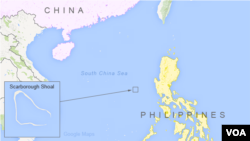The Philippine Navy is upgrading its capabilities at a time of continuing tensions with China over disputed territory in the South China Sea.
In recent weeks, an Indonesian naval shipbuilder started work on two "strategic sealift vessels" that the Philippines is acquiring for more than $87 million and expects within two years, said Commander Lued Lincunad, a navy spokesman.
Each one "will enhance our defense capability and operational capabilities. It has a helipad and can accommodate three choppers at any one time," Lincunad said. Each can be used for command and control, and each "can house a battalion of the marines" and special operations forces.
The vessels represent the navy’s latest efforts to control a resource-rich and strategically valuable expanse of ocean.
As part of a five-year, $1.8 billion military modernization program, the navy already has acquired several big-ticket items, including two frigates that used to be U.S. Coast Guard cutters. The nearly 50-year-old ships, retrofitted with modern munitions and companion helicopters, have been patrolling the archipelago’s shores for the past two years.
Four more frigates are on order and another two navy helicopters identical to the three already in use are expected to arrive by May.
Upgrading resources
The Philippines' annual military spending is $2.6 billion, miniscule compared to China’s $132 billion military budget in 2014. But Manila has focused its resources on improving its capability to monitor and respond to developments in the South China Sea.
China, which claims practically the entire South China Sea, has steadily increased its presence in the contested region in recent years. Now, Chinese construction teams are reclaiming land on outcroppings among some of the Spratly Islands that the Philippines claims.
Chinese surveillance ships have also regularly driven away Philippine vessels from contested reefs and shoals, including Scarborough Shoal, which the Philippines says is well within its 370-kilometer exclusive economic zone. Vietnam, Taiwan, Malaysia and Brunei also have claims in the resource-rich sea.
Philippines, Japan make pact
Last week, the Philippine Department of National Defense and Japan’s Ministry of Defense for the first time signed an agreement to forge closer defense ties on matters such as joint military drills and cooperation on global security.
Without giving specifics, officials said both countries share the same view on the situations in the South China and East China Seas, where China’s high visibility has raised anxiety among its neighbors.
National defense spokesman Peter Paul Galvez said the Philippines is looking for support from Japan in intelligence, surveillance and reconnaissance. "Any of those capabilities where they could probably help us out, that’s what we’re requesting," he said.
The Philippines is building an $18 million coast watch command center. It will coordinate communications among the navy, coast guard, maritime police and other agencies to guard its maritime borders. Lincuna said the watch system includes a network of land- and ship- based surveillance equipment.
Galvez said the country is also looking to Japan for help with humanitarian and disaster relief capabilities.
Show of self-reliance
The Philippines’ small-scale buildup demonstrates to the United States, its only treaty ally, that it is helping itself and not just relying on outside partnerships, said Carl Thayer, a Southeast Asia security analyst with the Australian Defense Force Academy.
Now if Filipino warships are attacked, "that triggers consultations with the United States," Thayer said. "It doesn’t mean they [Filipinos] have to be reckless. It means that China now has to take into account those vessels. You call that extended deterrence: You punch the Philippines, you get Uncle Sam behind them."
The Philippines is also keeping up and building strategic partnerships with other neighbors. Last week, the Philippine and Vietnamese foreign ministers held talks on strengthening security ties.
Australia announced last week it will donate to the Philippines two refurbished 40-year-old landing craft vessels capable of transporting "large amounts of cargo, personnel and equipment" to hard-to-reach shores.





